P4P Volunteer Traveler Sue Hansen’s Update on the P4P Power of Milk (POM) Program
The P4P POM program is running well and is impressive. It is uplifting to see that we are helping many children, but also sad that a few are still very malnourished. It is an important focus of the P4P Health Committee to move from treatment of poverty and the malnourished to prevention – but much work remains to be done!
Our POM Day visit was incredible. Both the US volunteers and Kenyan staff were involved, including serving lunch to the families, assisting with the food basket distribution, and participating in the infant checks. Here P4P volunteers join staff to serve P4P POM families.
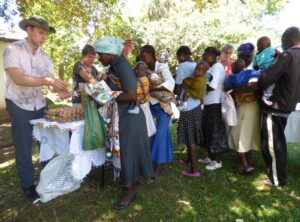
Currently there are 31 families enrolled our POM program, with a number of others on the wait list. The wait list families are attending the nutrition/prevention classes and receive the lunch, but not food baskets or “take home” baby supplements.
On the day we visited 4 babies “graduated” from the POM program. Data from the POM day shows that in February 7 babies are severely malnourished, with another 11 very malnourished. The remainder are still considered malnourished but are steadily improving. The babies are always measured and weighed on POM day in order to assess their progress.
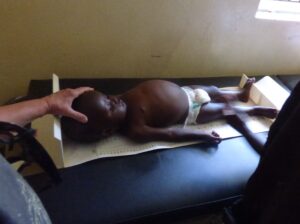
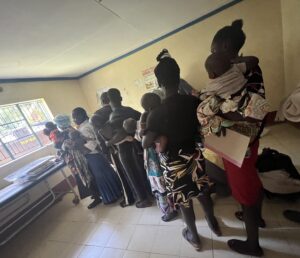
In this picture, P4P volunteers Jeremy Gratz and Melinda Tompkins prepare to hand out these beautiful handmade blankets donated from a volunteer in Spokane.
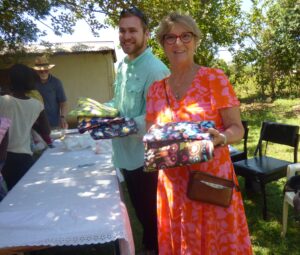
An important part of the POM program is P4P staff going on “home visits” to the families who are either new to the program, or whose babies are severely malnourished and struggling.
We accompanied staff on a couple of these home visits. Both families lived at least 3 miles from the clinic – both attend the weekly POM program. Since neither family has transportation, it means they must walk
One of the families is a young woman with twins – who are now 2 years old. The boy – Bonofos – was very ill from birth, and at one point required a blood transfusion. He is in the POM program. The girl twin has had no problems and is not in the program. Mom also has a 9-month-old that is doing well. Here is a picture of Mom and children during the home visit.
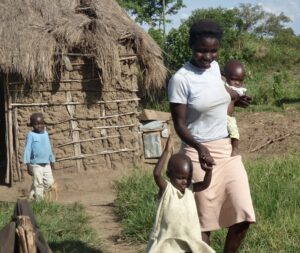
The other family – parents with 3 children were home and another child was away at Primary School. Sadly, the father was recently disabled by what we could discern was probably a stroke. His whole left side is paralyzed, and so it is very difficult for him to work in the field or do much to help at home. Mom relayed that she wishes someone could help her build a better house, as the roof leaks on theirs.
It is obvious from our observations that both Rose and Charles are well respected and listened to by the POM families. They were both able to speak frankly to the families and direct them in taking care of their babies and family.
We are working on prevention! P4P Staff member Rose spent a considerable amount of time with Melinda and me, going over all the elements of the prevention program. She is well versed in the causes of malnutrition and gave us a very detailed and informative summary of the factors affecting nutrition and the preventive strategies.
Rose and Charles both acknowledge that the POM weekly food baskets are a short-term solution to infant/child nutrition and food insecurity.
Fathers are encouraged to be involved in the program, and to increase sustainability, Rose and Charles discuss the following items with families – both at the weekly nutrition classes, and at the home visits.
Family planning and contraception is discussed with new mothers – and they are encouraged to obtain contraceptives from the clinic (for free).
Prenatal visits are also encouraged. These are free and include supplements for the mother.
New parents can receive mosquito nets and malaria medication.
Food preparation – How to prepare foods and what types of food are good for family members and babies – during home visits, Charles and Rose check on how the food basket items are being used – who is eating them, etc.
Water Treatment Education – Water Guard is available at the local clinics and P4P has helped distribute Water Guard. Rose said that if this is not available, she encourages families to boil their water.
As families become more stable, with Joshua’s observation and input, Rose and Charles talk to families about becoming a P4P Farming God’s Way farmer.

Recent Comments